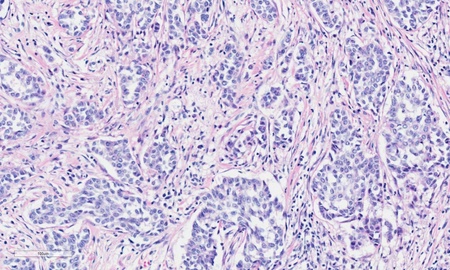Tremendous progress has been made in tackling breast cancer over the last few decades and in many instances, it’s not the death sentence it perhaps once was. This has been underpinned by initial discoveries in laboratories, which have been translated into clinical benefit. But we need to do more. Breast cancer is not a single disease and despite decades of research, we still have only 3 ‘biomarkers’ - molecules present on cells - that are used by doctors to guide them towards how to treat breast cancer. And we’re not very good at telling which breast cancers will become resistant to some treatments. Research holds the key.
Here at the University of Aberdeen we are assembling a team of doctors and scientists who will work closely together so we can better understand breast cancer. To study human disease needs human tissues and we are fortunate to have the Grampian Biorepository co-located with the research labs on the Foresterhill site. We ask permission from patients to use any of their breast tissue, which might remain after doctors have taken what they need to make a diagnosis. This is incredibly valuable for us, as this tissue would normally just go in the bin so we are grateful to patients who allow us to use their tissues in research. Working closely with pathologists, we use these to model breast cancer in the lab and to examine responses to drugs. These tissues also allow us to study how cancer cells interact with other types of surrounding cells, for example cells of the immune system, and how they may influence their behaviour. Often this is complex and we are looking at ways of teasing this out in the lab using many of the state-of-the-art pieces of equipment which the Institute of Medical Sciences has invested in.
We also study breast cancer in men. To a lay person, a breast cancer diagnosis in a man is often surprising. Of course, breast cancer in men is much less common than it is in women; for every man who receives a diagnosis, around 135 women will be diagnosed. Through international collaboration, we have assembled a collection of close to 500 male breast cancer samples. This is one of the largest collections anywhere in the world. We are using these samples to study the biology of male breast cancer and to examine how this may differ from breast cancer in women. There is evidence that male breast cancer may be increasingly diagnosed a so we need to understand its biology more fully so that the best and mores relevant types of treatments can be offed to patients.
We are about to embark on an exciting new project studying the effects of environmental chemicals on breast cancer development and how this might relate to breast density, a known risk factor for breast cancer. This is a 3 year PhD project which will be carried out by a recent Aberdeen graduate who has just joined my lab and we hope to be able to report the results in the coming years. There are exciting times ahead for breast cancer research at Aberdeen!


